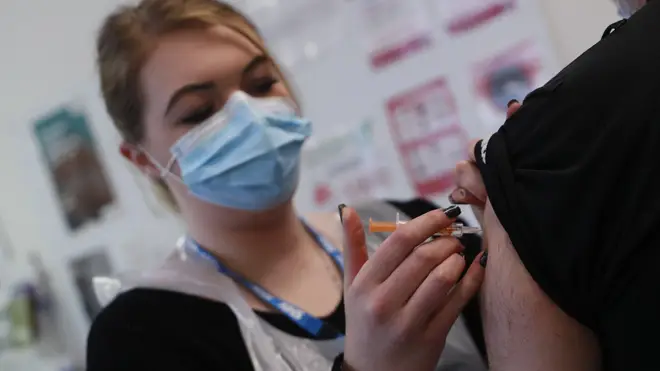
Ian Payne 4am - 7am
18 March 2021, 14:15 | Updated: 19 March 2021, 05:41

The UK's medicines regulator today said the benefits of the AstraZeneca jab "far outweigh the risks" and that evidence suggests the jab does not cause blood clots.
The Medicines and Healthcare products Regulatory Agency (MHRA) said: "Following a rigorous scientific review of all the available data, the evidence does not suggest that blood clots in veins are caused by Covid-19 Vaccine AstraZeneca.
"Following suspensions by some countries of the COVID-19 Vaccine AstraZeneca over suspected blood clots, the MHRA confirms that the benefits of the vaccine in preventing COVID-19 far outweigh the risks.
"People should still go and get their COVID-19 vaccine when asked to do so."
READ MORE: Boris Johnson to lead Covid-19 news conference at 5pm
READ MORE: 1.7m doses need re-testing and supplies from India delayed, Matt Hancock confirms
Following a rigorous scientific review of all the available data, the evidence does not suggest that blood clots in veins are caused by #COVID19 Vaccine AstraZeneca.
— MHRAgovuk (@MHRAgovuk) March 18, 2021
People should still go and get their vaccine when asked to do so.
Our new statement: https://t.co/h74nktC8if pic.twitter.com/CQ3dyAQ8ja
The MHRA said it had received five reports of a rare blood clot after five men received the Oxford/AstraZeneca vaccine.
The clot - cerebral venous sinus thrombosis (CVST) - prevents blood from draining out of the brain.
Listen & subscribe: Global Player | Apple Podcasts | Google Podcasts | Spotify
One of these cases was fatal, experts said.
They stressed that it was not possible to say whether the clots were caused by the vaccine.
Phil Bryan, MHRA vaccine safety lead, said: "We take every single report of a suspected side effect seriously.
"We have received five reports of what is a very unique, specific form of blood clot ... and this is similar to some of the cases that have been reported in Europe in the past week or so.
"What we don't know is whether these cases have been caused by the vaccine.
"We are working closely with our experts and haematologists to try to gather more information to determine this."
He added that these clots do happen very rarely naturally.
Dr June Raine of the MHRA said while investigations were ongoing, as a precautionary measure, anyone with a headache that lasts for more than four days after vaccination, or bruising beyond the site of vaccination after a few days, should seek medical attention.
"However, please remember that mild flu-like symptoms remain one of the most common side effects of any Covid-19 vaccine, including headache, chills and fever," Dr Raine said.
"These generally appear within a few hours and resolve within a day or two, but not everyone gets them."
MHRA chief executive Dr June Raine will speak later at a press conference alongside Boris Johnson.